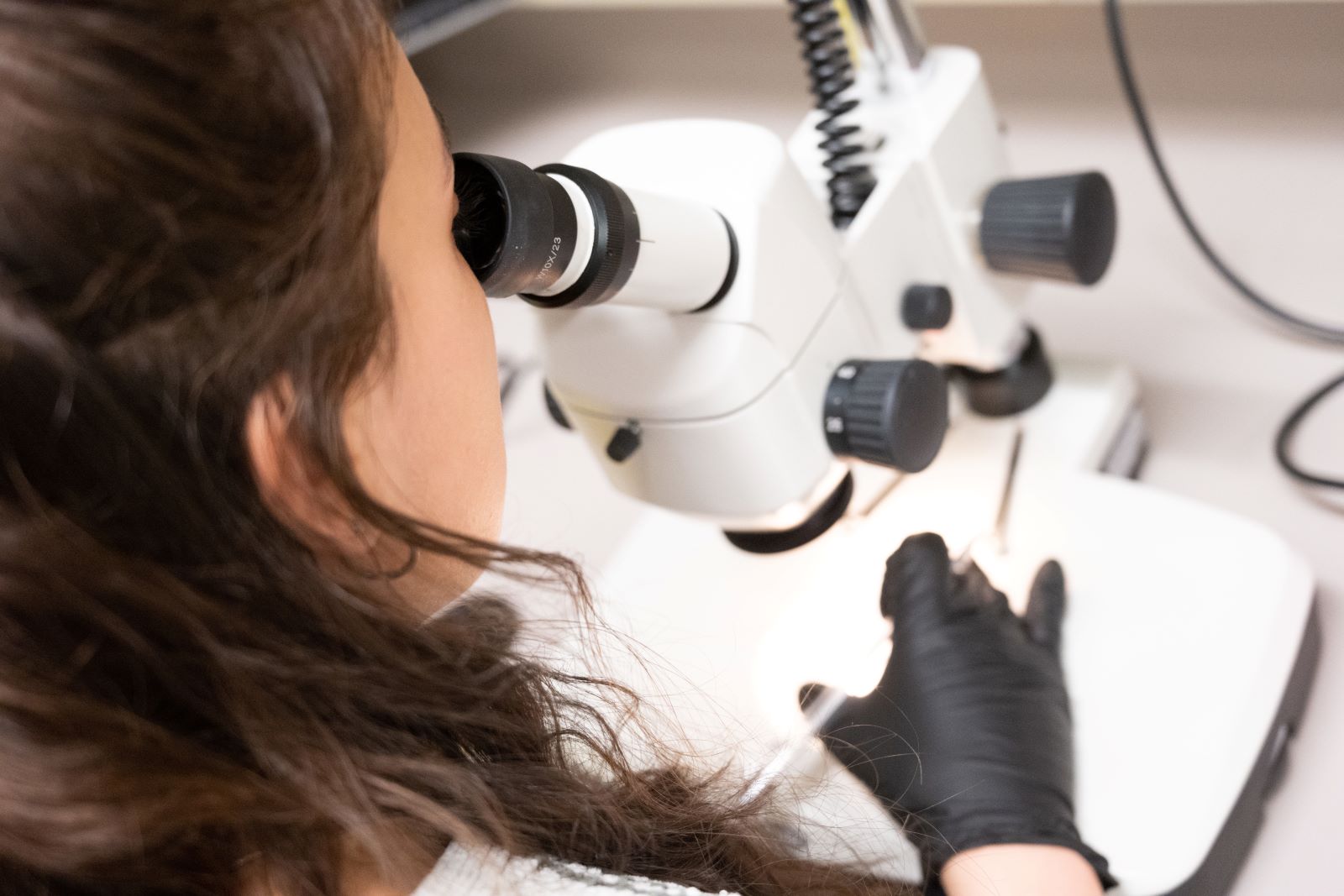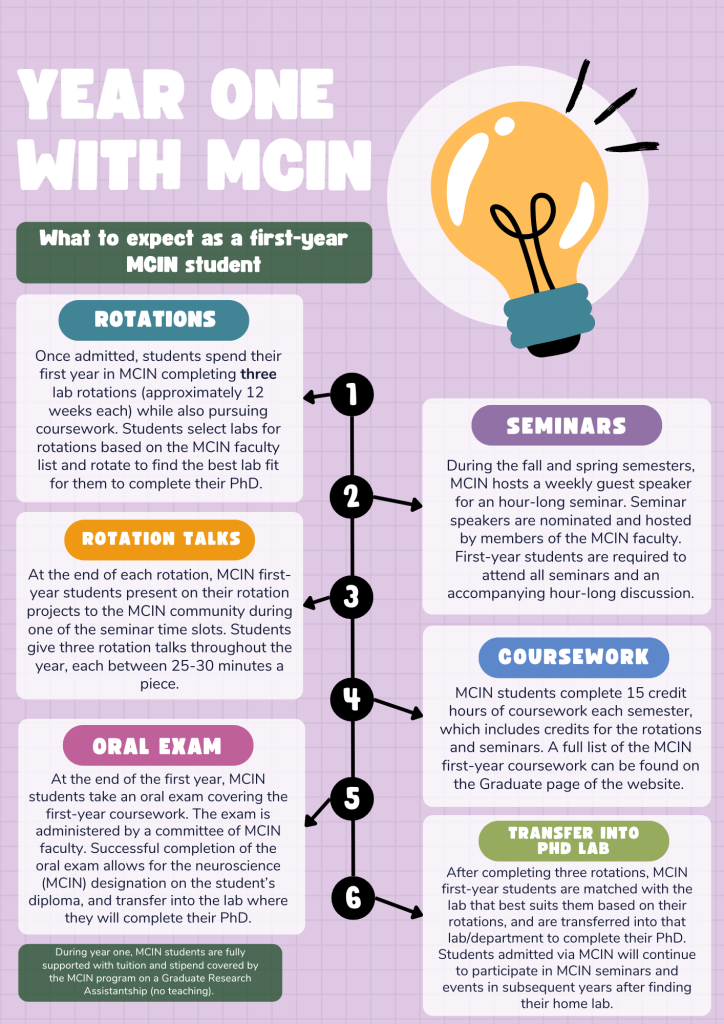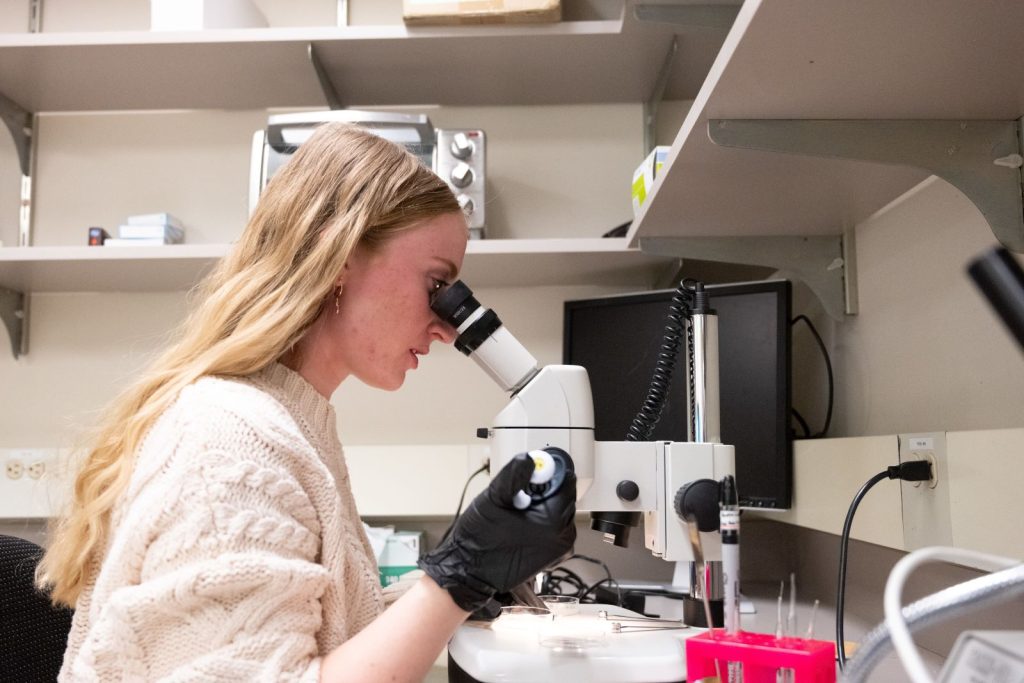
A guide to getting a PhD with MCIN
Why study with MCIN
Neuroscience research increasingly requires interdisciplinary approaches – spanning levels of analysis from the molecular regulation of gene expression to human behavior. The MCIN Graduate Research Program at Colorado State University provides a unique research-intensive PhD program that brings together faculty from across 12 CSU departments to tackle this very issue.
The multi-disciplinary approach of the MCIN program allows graduate students to tailor their research experiences and coursework to their interests and scientific needs. Students also benefit from a small cohort of incoming students, ensuring increased access to campus resources and a strong sense of community. The international reputation of the faculty members and their ability to attract strong extramural support has resulted in the program being designated as one of Colorado State University’s Centers of Research and Scholarly Excellence.
How it works
MCIN is a one-year entrance program to a PhD in neuroscience. During the first year, MCIN students are fully supported (tuition coverage and stipend provided by the program) on a Graduate Research Assistantship (GRA) as they complete three lab rotations and pursue first-year coursework. Each lab rotation is approximately 12 weeks long and designed to help students find their best fit to complete their PhD.
At the end of the year in MCIN students will complete an oral exam covering the first-year coursework and be transferred into the department of the lab they choose–based on their rotations–to complete their PhD. For a list of participating MCIN labs/faculty that may be available for rotations, check out our faculty page here.
MCIN will support students on a GRA for the first year. For the remainder of their PhD students will either be supported with a stipend and tuition coverage on a GRA (Graduate Research Assistantship) or a GTA (Graduate Teaching Assistantship), depending on which lab they enter. Please feel free to reach out to the program if you have questions regarding tuition and stipend support.

Research strengths
Molecular and cellular regulation of neural function
Molecular and cellular neuroscience is one of the core research strengths of the MCIN graduate research program. MCIN faculty examining the molecular and cellular basis of neuronal function use a wide variety of genetic model systems to assess the role of activity dependent changes in neuronal function. Research spans from examining the proteins involved in neurotransmitter release, to activity dependent transport of ionotropic receptors, to examining the cellular mechanisms controlling neurodevelopment. Many faculty are further interested in understanding how disease impinges upon molecular and cellular processes to disrupt normal neuronal function.
Circuits and systems neuroscience
One of the primary goals of neuroscience research is to link specific patterns of neural activity to defined behaviors and/or outcomes. One of the unique strengths of the MCIN program is that circuit and systems neuroscience questions are embedded within an interest in understanding the organism as a whole. For example, MCIN faculty are examining diverse questions related to: the neural control of social behaviors, neuroendocrine regulation of stress and cardiovascular function, and the neural circuits contributing to fear and substance use disorders. Students interested in pursuing research in circuits and systems neuroscience deeply benefit from the integrative approaches and whole-animal perspective offered within the MCIN graduate research program.
Cognitive and human neuroscience
The MCIN program also boasts many faculty interested in understanding cognitive and human neuroscience. Research in this domain focuses on understanding both normal and abnormal human brain development and aging, as well as how various insults such as drug use or traumatic brain injuries alter brain function. MCIN faculty address such questions through using a broad range of techniques from cognitive psychology, to structural and functional neuroimaging, to EEG recordings.
Neuroscience of disease
MCIN faculty are actively engaged in research examining the molecular mechanisms and functional consequences of various neurodegenerative diseases in both humans and animal models. For example, numerous faculty are investigating the cellular and molecular pathways resulting in prion propagation, as well as other neurodegenerative diseases such as Parkinson’s disease and Alzheimer’s disease.
Program strengths
Small cohort
The small cohort of the MCIN graduate research program provides students with numerous benefits over larger graduate programs. Although MCIN graduate students disperse to numerous departments across campus, the small cohort structure ensures that students maintain a strong identity and sense of community throughout their graduate program. Additionally, MCIN hosts numerous formal and informal gatherings, designed to bring students across the program together for seminars and other training events.
CSU Center for Research and Scholarly Excellence
The MCIN program is one of CSU’s Centers for Research and Scholarly Excellence. This designation reflects the commitment of the faculty in securing extramural funding and providing a positive training environment for graduate students in the program.
Customized coursework
One of the truly unique features of the MCIN graduate research program is the ability to truly tailor your coursework to your individual research project. Although many programs offer a wide range of electives, the interdisciplinary focus of the MCIN program allows each student to design a course of study with their primary mentor, thereby tailoring coursework to the individual research question at hand.
Interdisciplinary approach
In addition to the expansive direct research opportunities in MCIN member labs, CSU is also internationally recognized for its excellence in veterinary training. This area of excellence extends to the MCIN program, as students are able to take advantage of world-class experts in animal physiology
Research-intensive program
MCIN students in the first year are supported by GRA appointments, meaning that students do not have to serve as teaching assistants in their first year. This support allows incoming students to (1) focus on finding a research home through three research rotations and (2) focus on taking relevant foundational courses to set students up for success throughout their PhD.


Recent Comments